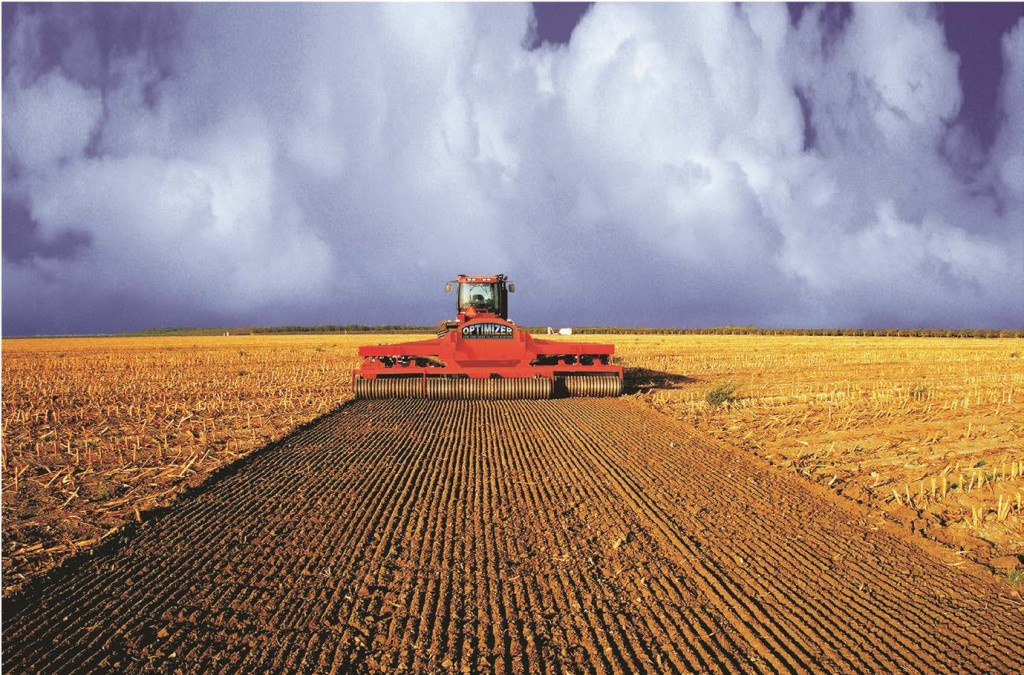 Tulare-based Tillage Management, Inc., has perfected the science of tillage as embodied in its patented Optimizer™ line of one-pass tillage equipment. The company’s founder, Kevin McDonald, a farmer and inventor, and its chief executive officer, Mark Hoffman, a Stanford-educated engineer and farmer, lead a team of engineers that continually improve and expand the Optimizer line of equipment, first developed by McDonald.
Tulare-based Tillage Management, Inc., has perfected the science of tillage as embodied in its patented Optimizer™ line of one-pass tillage equipment. The company’s founder, Kevin McDonald, a farmer and inventor, and its chief executive officer, Mark Hoffman, a Stanford-educated engineer and farmer, lead a team of engineers that continually improve and expand the Optimizer line of equipment, first developed by McDonald.
“We designed the Optimizer to lower costs by creating a quality seedbed from the post-harvest stage in just one pass,” Hoffman said. “That means less fuel, less labor, less tractor maintenance and less time for tilling. Not only does this lower costs, but fewer passes also results in better crop yields thanks to less soil compaction. The Optimizer also generates less particulate matter, qualifying for the 2008 Farm Bill and allowing the farmer to meet strict environmental regulations.”
Tillage Management offers three models of the Optimizer: the 12-foot-wide Model 2000, the 18-foot-wide Model 2500, and the 18-foot-wide Heavy Duty Model 4000. All models are roughly 40 feet long, requiring tractor horsepower ranging from 350 to 600 HP. The variety of widths and implement options available make it possible to customize tillage for each crop, soil type and farmer, no matter how big or small. The line of equipment offered by Tillage Management is growing to support other tillage operations as well.
“The Optimizer is a single piece of equipment designed to simplify farming by performing all conventional tillage operations in just one pass,” Hoffman explained. “Operating at an optimal speed of five to seven mph, the Optimizer covers eight to 12 acres per hour. Fuel and labor are reduced by 50% or more, and soil compaction is significantly reduced. Results of an Environmental Protection Agency study show dust and air pollution are reduced by an average of 50%.”
Tillage is the process of preparing soil for the raising of crops, and in its broadest sense, involves mechanical agitation of the soil. Tilling the soil helps to reduce compaction and aerate the soil, which is necessary to promote crop growth. Tilling also serves to mix any residual plant matter into the soil where it can decompose, providing nutrients for the next crop and cutting down threats of disease and crop infection. Preparing a field typically takes four or more passes using different implements to break up compact layers, mix in plant matter left from the last harvest, and leave a smooth, level seedbed to nurture the new crop.
Tillage Management took the conventional system to an unprecedented level by combining a series of complimentary implements to complete in one pass the work that previously required four or more passes over a field. In the 40-foot frame sit discs to cut and incorporate plant matter, chisels to loosen soil in the traffic pan layer and below, reels and baskets to break up clods, and a roller to smooth the top layer, incorporating a leveling system to leave behind a flat, perfect seedbed.
A single efficient pass also allows the farmer to complete tillage in the ideal window, optimizing the soil conditions for the new crop. The Optimizer may also be fitted with an optional air-seeder for forage crops, leaving the field both tilled and planted in a single pass. In light of such an accomplishment, Tillage Management took significant measures to protect its groundbreaking (both literally and figuratively) technology.
Desiring to take a Silicon Valley approach to protecting its San Joaquin Valley-generated intellectual property, the company asked its local counsel to help identify the best Silicon Valley legal counsel to pursue patent protection for its new technologies.
The search resulted in identification of patent attorney Brian Bathurst of Menlo Park law firm, Carr & Ferrell, LLP.
“Ironically, I travelled all the way to Menlo Park to meet Brian, who grew-up in neighboring Visalia and who is still actively connected to the area,” Hoffman said. “In fact, all of our subsequent meetings were held here in Tulare, when he was in the area.”
Bathurst, working closely with Mark Hoffman and his team, first focused on the unique experience provided by the Optimizer: generation of the perfect seedbed in only a single pass. They next identified for potential patent protection the new technologies that enabled the unique experience provided by the Optimizer.
One such technology is the modular design of the Optimizer that makes it possible to add or exchange tillage components in the field to meet a farmer’s changing needs, crops, and soil conditions. This customizable setup will help make it possible to bring Valley-grown innovation to farmers across the United States and make Optimizer a household name in effective sustainable agriculture.
